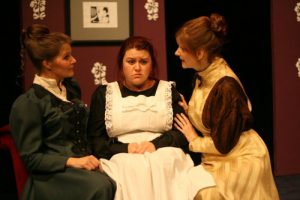
Bench Theatre have a reputation for always looking for pieces that provide strong female roles and this three-hander fits the bill perfectly. Of course with only three characters there’s little breathing room for any of the performers here and the first act sees them struggle a little with the beat of Mamet’s discourse (the playwright famously brings a metronome into rehearsal rooms to aid actors). It’s a flow that is distinctly American and can be tricky for us Brits to fully embrace, but in the second act there are no such jitters and the whole flows wonderfully.
The plot is, in the Wilde tradition, very simple at heart but with a course of diverting and bizarre little twists. Anna and Claire are two New-Englanders used to a certain standard of living. The former has a wealthy protector while the latter professes to have fallen in love. Both relationships show that the veneer of good living is just that and the two ladies, reliant on each other for friendship and financial security, watch their world fall apart as Claire announces that the young lady she loves is coming to the house for a rendezvous. Anna’s disgust soon turns to jealousy and she becomes involved in proceedings while finding time to constantly harangue her put-upon maid.
Robin Hall makes for a strong Anna, playing up to the affected disinterest of the character whilst revelling in the increasingly profane and venomous interchanges with friend and servant. She’s equalled by Julie Wood’s effervescent Claire who forever tries to turn Anna’s rage to a happier mood. Both actresses put their characters across well, but Jessi Wilson’s delightful Scottish maid is a complete scene stealer and had this curmudgeonly writer emitting booming belly laughs.
Director Mark Wakeman uses the relatively confining Spring space well and wisely lets the ladies find their characters and progress the story through them.
This may not be among Mamet’s most celebrated work, but on this evidence it certainly deserves more attention!
"I'm just focused on getting that third trophy and enjoying the rest of my time with the guys here." David Goodwin on preparing for Playoff Finals Weekend
photo courtesy of William Cherry, Press Eye It’s EIHL playoff final weekend! After eight months of toil, four teams will face off for the chance to lift the last silverware of the season. First up Belfast Giants take on Cardiff Devils so I caught up with David Goodwin to see how the team are feeling after a battle against Dundee Stars and how ready they are for the games ahead. It was, I suggest, an intense weekend for the team. “Yeah, I mean it was. It always is. The quarterfinals… you never know what you're going to get.” Goodwin replies. “On one hand, you have us, the Giants, who are coming off a league title win, so we're on a high. But then you got Dundee, who don't want to go away quietly. They were fighting and scratching and clawing for every inch and it lead to two feisty games. “I give Dundee a lot of credit. They threw everything they had at us. But ultimately, I think our consistent play, maybe some of our higher skill was able to shine through and get the...

Comments
Post a Comment